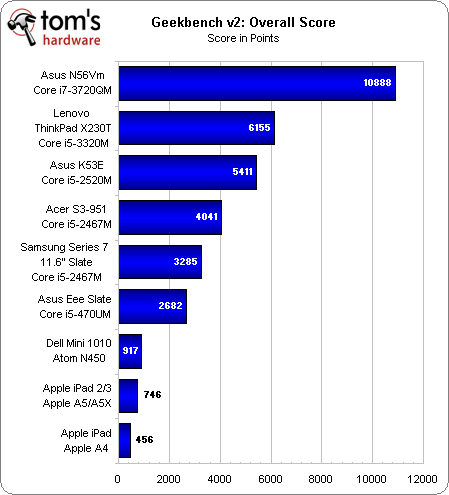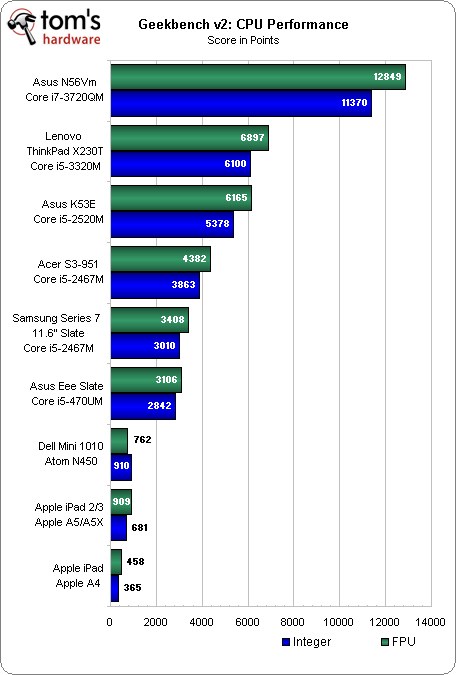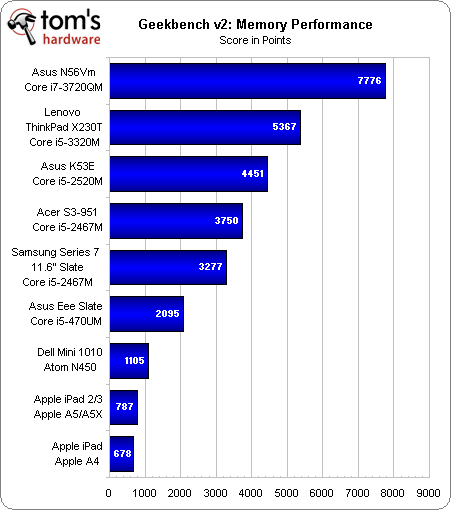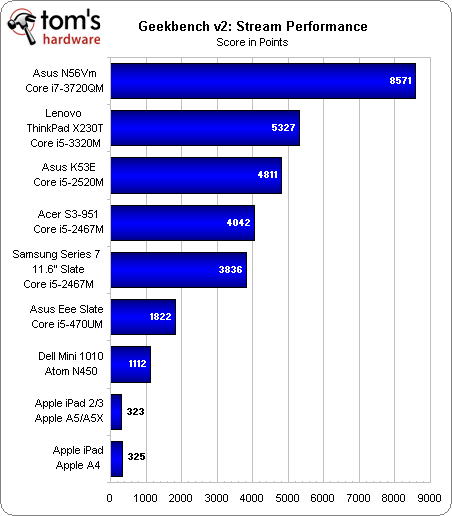Lenovo's ThinkPad X230T Tablet PC, Tested And Reviewed
CPU Performance: Comparing Tablets And Tablet PCs
Mobile Ivy Bridge-based CPUs are only slightly faster than their Sandy Bridge-based predecessors. Covered last month in Second-Generation Ultrabooks: Faster And Cheaper With Ivy Bridge, we realize similar results in our synthetic GeekBench chart. But more interesting than comparing two evolutionary architectures from Intel is how the power-hungry, performance-oriented x86 hardware in tablet PCs differs from the ARM-based SoCs installed in tablets.
Just take the apples-to-oranges match-up between the X230T and iPad 3. The performance gap between the Cortex-A9-based tablet and Core i5 processor is vast. According to Geekbench, there is a ~8x performance advantage favoring the Core i5-3320M. Naturally, that makes tablets look pretty homely. But it's also important to remember that devices like the iPad use operating systems with much lighter resource requirements than Windows. The trade-off, of course, is that multi-tasking isn't handled as elegantly, and the applications are generally much leaner (read: endowed with fewer features).
In contrast, tablet PCs wield operating environments that make it easy to run multiple heavy-duty apps at the same time. This really isn't something that benchmarks can tell you. But it has to be a consideration when you weigh both form factors against each other.
Get Tom's Hardware's best news and in-depth reviews, straight to your inbox.
Current page: CPU Performance: Comparing Tablets And Tablet PCs
Prev Page A Rare Tablet PC Catches Our Attention Next Page PCMark 7 Results: Comparing Other Tablet PCs-
greghome The problem I see with the X-T series Convertible tablets though, is that for the same price I can purchase a X230 and a Thinkpad Tablet and still have money left.Reply
I can imagine a market for it, but once the Thinkpad Tablet 2 launches with Windows 8, I'd say there market would grow even smaller. just my 2 cents :) -
ojas Hmmm interesting to see the A5 just about manage to keep up with the two year old Atom N450.Reply
Anyway, Tom's: X1 Carbon review please! :D
Read that its trackpad is best-in-class for a Windows laptop. -
Zetto These machines should come with the leather sleeve included, it really comes into it's own in the sleeve.Reply
I've carried an older model around all day for years, the battery lasts 8 hrs easy with a good power profile setup and intermittent use.
OneNote is gold on it.
My users often borrow it just for it's presentation benefits as well.
This new model will shine with Win 8. -
jaquith As a past owner of the IBM/Lenovo Convertible I very rarely used it as a 'Tablet.' However, with Windows 8, and I don't like Windows 8, you'd probably use the 'Tablet' mode a lot more.Reply
I use an HP EliteBook Mobile Workstation and have little desire to go back to the Tablets.
Originally I wanted folks to be able to 'sign contracts' out in the field, but in practice Paper wins. -
cknobman Lets see:Reply
Big, thick, heavy
Ugly
Crappy battery life
When you think about it I could:
Buy an Asus Zenbook 1080p for $999
Google Nexus tablet for $199
Both combined would be as thin and light (or thinner/lighter) than this lenovo contraption while offering superior battery life and screen quality (at least on the ultrabook).
This product just seems like a fail. -
cknobman - you're really not the target market for this thing. They're fantastic for health care, home health, etc.Reply
-
greghome cknobmanLets see:Big, thick, heavyUglyCrappy battery lifeWhen you think about it I could:Buy an Asus Zenbook 1080p for $999Google Nexus tablet for $199Both combined would be as thin and light (or thinner/lighter) than this lenovo contraption while offering superior battery life and screen quality (at least on the ultrabook).This product just seems like a fail.Reply
From your post, I'd say you've never really used a IBM Thinkpad before.
The Thinkpad lines were never meant for normal consumers like you. If you've compared to built quality as well, the Thinkpads, especially the T and W series are wonders.
and unlike the ZenBooks or Macbooks......you can step on them and the hinge will be able to stand it. -
cknobman greghomeFrom your post, I'd say you've never really used a IBM Thinkpad before.The Thinkpad lines were never meant for normal consumers like you. If you've compared to built quality as well, the Thinkpads, especially the T and W series are wonders.and unlike the ZenBooks or Macbooks......you can step on them and the hinge will be able to stand it.Reply
Actually I've used ThinkPads a lot as I am a software developer. Two of my last 4 jobs issued them to the developers as their primary workstations. ThinkPad build quality, usability, design are all top notch for business users.
My comment was in response to the way this article was phrased. This article was not necessarily written in the context of a business user and actually was slanted more towards personal use and its ability to replace a tablet and laptop combo while traveling.
In that context I do see this product as a fail. -
Wisecracker I thought it was common knowledge that Acer and Compal have Trinity Win* Tab-hybrids coming out next month -- may even be articles on Toms about it.Reply
I can't really recall but pricing was something "less than $900" with Brazos II models substantially less.



